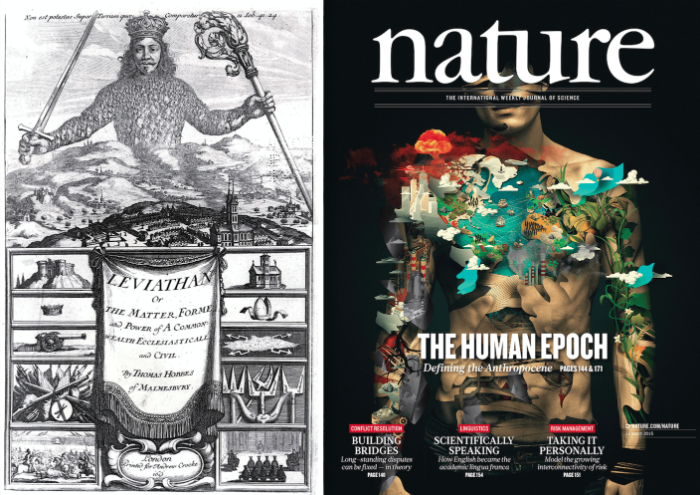
The hottest year on record was 2016. It was also the year scientists advised that Earth’s citizens were now living in the Anthropocene, the name proposed for an epoch in which humans influence geology and environment on a global scale.
The concept of citizenship originally described inhabitants of (probably walled) towns. Some insistence on specificity of place certainly remains, although the concept today generally refers to nations rather than cities. But what are concerned citizens to do in the face of problems such as climate change, which cannot easily be contained by walls or borders, and to which we all contribute?
Alberto Seveso’s cover illustration for a 2015 edition of Nature dedicated to the Anthropocene highlights some of the key factors that turned humanity into a geophysical force, including nuclear technology, the evolution of agriculture, and the industrial revolution. The depiction of a large body containing smaller human figures bears more than a passing resemblance to one of the most iconic renderings of sovereignty and citizenship: Abraham Bosse’s frontispiece for Hobbes’ Leviathan.
Environmental citizens
Like Bosse, Seveso also asks the individual citizen to consider themselves as part of a wider collective – but this time, not just as part of a nation state, but of a planet-shaping (but not planet-controlling) Anthropos.
Imagining what citizenship might mean in such an era is tricky, not least as it means thinking across both borders and generations. But there are mechanisms for attempting to balance the rights and responsibilities of individuals, nation states and our cosmopolitan obligations to a shared biosphere. Although 2016 ended with the election of a president who has proclaimed climate change to be a Chinese hoax, it began with a cautious optimism about the Paris agreement’s pronouncement of “common but differentiated responsibilities”.
One of the most striking artworks of ARTCOP21, an exhibition which ran alongside the 2015 Paris climate conference, was Lucy and Jorge Orta’s Antarctic World Passport Delivery Bureau. Participants were issued with an Antarctic passport and “invited to sign a commitment charter for the protection of the environment and the future of the human race”.
The idea of holding dual-citizenship with the Antarctic isn’t shallow idealism. Even the most ardent brayers of Jerusalem should recognise that England is likely to be a lot less green and pleasant if, say, ice-melt from the cracking Larsen ice-cap helped disrupt the Gulf Stream.
This other Eden
And yet even a type of ecologically aware cosmopolitanism which might simply inform, let alone supersede, the attachments of national citizenship is anathema to the UK’s current government. Such notions of Britishness channel nationalist myths that echo John of Gaunt’s famous speech from Richard II.
Shakespeare’s play resonates curiously with Brexit Britain, and not just because in it a careless English ruler is usurped by a cynical new regime which later has to face down rebellion from Scotland and Wales. John of Gaunt, the Duke of Lancaster, has a vision of England that is not only idyllic (“this other Eden, demi-paradise”) but in glorious isolation, cut off by the sea which serves as a “wall” or “moat” against “the envy of less happier lands”.
Fast-forward 400 years and the people of Lancaster, like the rest of Lancashire, voted to “take back control” of their borders in the July 2016 referendum. Six months earlier, Storm Desmond, potentially exacerbated by climate change, had left large swathes of the county flooded. Six months after the referendum and in the face of civil disobedience, the government overruled Lancashire Council and forced through fracking in the county. In this political and physical climate, local sovereignty only goes so far.
It is striking that the Anglosphere is so fascinated with maintaining boundaries – Trump’s wall, Brexit borders, Australia’s disgrace at Nauru – but often fails to acknowledge the link between climate and migration. Or perhaps not, if you consider Anglophones are most likely to deny the reality of climate change.
But, as Naomi Klein points out, from water stress in the Middle East to major coastal cities under threat from flooding, “we are headed for a whole world of people searching for a home that no longer exists”.
Citizens of the Anthropocene
Thinking about the Anthropocene shatters our sense of the world as a stable backdrop on which politics plays out. One way of viewing the renewed popularity of political strongmen – Trump, Putin, Xi, Modi, Erdoğan – is to see them as comfort blankets. Against geopolitical uncertainty, they offer coherent nationalist identity under a strong sovereign. But a retrenchment of nationalism is not well-suited to the international environmental challenges we face.
Dwelling on Seveso’s picture hints at alternatives. Here the giant Leviathan-esque body contains not only humans, but ecological processes, technologies and, with the Renaissance ships in the middle of the torso, history too.
Awareness of the legacy of colonialism and imperialism has informed one of the key criticisms of the word “Anthropocene”: that it is a homogenising term that treats humanity uniformly when neither risk nor responsibility is shared equally. Another key criticism of the Anthropocene concept is that the emphasis on human impact morphs into notions of human control – including fantasies of geoengineering our way out of our troubles.
So it is notable that Seveso’s figure, unlike Bosse’s, is empty-headed: it has half a face but no obvious brain. It is not towering above the city and the landscape, not a unified sovereign intelligence, not in control – just a body intertwined at every level with ecology, politics and technology.
One way of negotiating the multifarious challenges of citizenship in the Anthropocene is to relinquish the fixation on “taking back control” and recognise the radical challenges to our agency from forces not only beyond our borders but beyond our species. In doing so, we can create informed citizens who recognise that they participate in citizenship on a changing planet that, whatever the science-warping mouthpieces of Murdoch and the Koch Brothers proclaim, will not be fooled into altering its course by alternative facts.